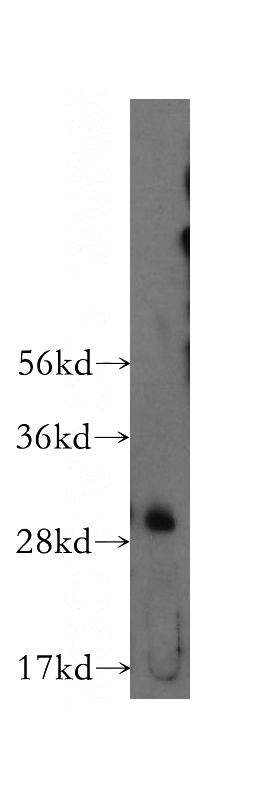-
Product Name
CTDSP2 antibody
- Documents
-
Description
CTDSP2 Rabbit Polyclonal antibody. Positive WB detected in human kidney tissue, HepG2 cells, K-562 cells. Positive IHC detected in human pancreas cancer. Observed molecular weight by Western-blot: 31 kDa
-
Tested applications
ELISA, WB, IHC
-
Species reactivity
human; other species not tested.
-
Alternative names
CTDSP2 antibody; NLI interacting factor 2 antibody; SCP2 antibody; Protein OS 4 antibody; OS4 antibody
-
Isotype
Rabbit IgG
-
Preparation
This antibody was obtained by immunization of CTDSP2 recombinant protein (Accession Number: NM_005730). Purification method: Antigen affinity purified.
-
Clonality
Polyclonal
-
Formulation
PBS with 0.1% sodium azide and 50% glycerol pH 7.3.
-
Storage instructions
Store at -20℃. DO NOT ALIQUOT
-
Applications
Recommended Dilution:
WB: 1:200-1:1000
IHC: 1:20-1:200
-
Validations

human kidney tissue were subjected to SDS PAGE followed by western blot with Catalog No:109721(CTDSP2 antibody) at dilution of 1:400

Immunohistochemical of paraffin-embedded human pancreas cancer using Catalog No:109721(CTDSP2 antibody) at dilution of 1:50 (under 10x lens)
-
Background
CTDSPs are C-class phosphatases that act on Ser 5 of the Pol II C-terminal domain (CTD) to decrease transcription [PMID:15681389]. CTDSP enzymatic activity is required for REST function, and knockdown of CTDSP induces the neuronal differentiation of mouse embryonic carcinoma P19 cells. CTDSP2 has been shown to enhance TGF-β signaling by the dephosphorylation of SMAD proteins and attenuates androgen receptor-mediated transcription [PMID:16724108]. It negatively regulates RNA polymerase II transcription by controlling the transition from initiation/capping to processive transcript elongation. It was recruited by REST to neuronal genes that contain RE-1 elements, leading to neuronal gene silencing in non-neuronal cells[PMID: 12721286].
Related Products / Services
Please note: All products are "FOR RESEARCH USE ONLY AND ARE NOT INTENDED FOR DIAGNOSTIC OR THERAPEUTIC USE"
